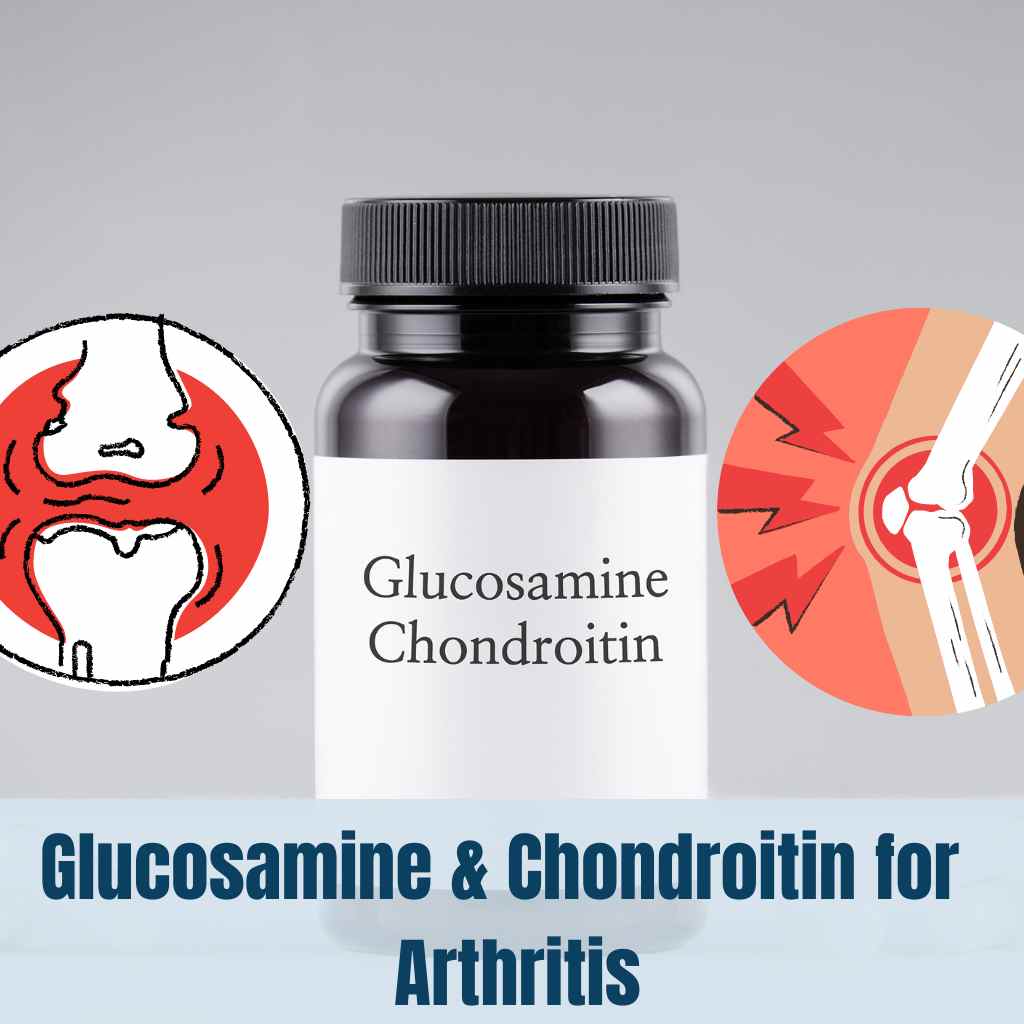SHARE
Are glucosamine and chondroitin supplements beneficial for patients with arthritis? As more and more people are interested in their health, taking supplements seems like a good idea. Considering that 62 million people suffer from arthritis, just in the United States, the supplements market is very profitable and is expected to grow every year. However, what is the scientific evidence behind using these supplements?
In this article, I will discuss
What are glucosamine and chondroitin?
What are supplements?
Are glucosamine and chondroitin helpful for arthritis?
How long should patients use glucosamine and chondroitin?
Do the Osteoarthritis Guidelines recommend supplements? Let’s find out…
What are glucosamine and chondroitin?
Glucosamine and chondroitin are both normal components of the cartilage tissue. They will participate in building the components of your joints. In certain diseases like osteoarthritis, both chondroitin and glucosamine are decreased. Naturally, many believe that taking a supplement will be an efficient way to stop or slow down the progression of arthritis.
What are supplements?
Supplements -are natural and/or synthetic products marketed to be added to your diet for optimal health results. However, because dietary supplements are categorized as “food,” not drugs, they are not required to undergo the rigorous testing that prescription drugs/ medication undergo. The dietary supplement manufacturers are responsible for ensuring these are safe before they are marketed, but they do not require any approval from the Food and Drug Administration (FDA). These manufacturers may not claim to treat, prevent, or cure any specific disease.
Are glucosamine and chondroitin helpful for arthritis?
Glucosamine and chondroitin are the most commonly used supplements for arthritis. However, the use of glucosamine and chondroitin remains controversial.
Where is this controversy coming from?
Well, some people are saying that the dose that you take is important. Many studies used doses of glucosamine sulfate of 1500 mg/day or chondroitin of 800 mg/day (1,2).
Other people say that the product’s brand matters or the product type (3). For example, this study suggested that a pharmaceutical grade of chondroitin might be better (4).
Let’s look further into this study and understand the findings better. They included 600 patients that received 800 mg of chondroitin daily. These researchers showed that pharmaceutical-grade chondroitin was superior to placebo but similar to non-steroidal anti-inflammatory medications like celecoxib in reducing pain and improving function in patients with knee osteoarthritis. These patients used chondroitin for six months.
I think it is essential to know that the study was supported by the company that produced the chondroitin.
How long should patients use glucosamine and chondroitin?
Understanding how long you should use supplements to see an effect is essential. One study published in 2010 showed that patients that take these supplements for the long term, two to three years, may have delayed progression of osteoarthritis. Some studies do not support these findings, and I think it is essential to know about these, too (5,6).
Think about the placebo effect. What is the placebo effect? A placebo is anything that seems to be like “real” medical treatment — but isn’t. When you get “placebo” pills, they do not contain the active substance. In many studies, the researchers compare the effect of medication with a placebo to understand the effect of that medication.
Now, let’s return to glucosamine and chondroitin, and I will discuss a landmark study called GAIT (or Glucosamine/Chondroitin Intervention Trial). They included about 1500 patients with knee osteoarthritis. The researchers compared glucosamine and chondroitin, alone or in combination with placebo and anti-inflammatory medications (7).
Gait Trial – NEJMOverall, the glucosamine and chondroitin alone and in combination DID NOT decrease pain in patients with knee osteoarthritis. However, a subgroup of patients might benefit from these supplements. Those are patients with moderate to severe osteoarthritis (7). GAIT TRIAL results -glucosamine and chondroitin in osteoarthritis
MOVES trial (8) found that the combination of glucosamine and chondroitin was as effective as celecoxib (a well-known anti-inflammatory medication) in relieving pain and swelling in knee osteoarthritis.
What is that meaning?
These supplements could be a good alternative for people who aren’t good candidates for NSAIDs because they have cardiovascular or other gastrointestinal conditions (8).
Do the Osteoarthritis Guidelines recommend these supplements?
Due to these conflicting results, the Osteoarthritis guidelines are not endorsing the use of glucosamine and chondroitin (9). Considering the safety profile is good, you may try to use them for about 6 months and see if your pain is improving.
Do you want to learn about other supplements?
In a previous blog, I presented scientific data about collagen supplements in patients with osteoarthritis. Before you start any supplement, I advise you to discuss your clinical situation with a physician who will review your risks and benefits. Supplements can be dangerous in some cases and can influence how other medications are absorbed. If you want to learn more about supplements and their scientific evidence, follow my blog posts and YouTube channel. If you are looking for a consultation for arthritis or autoimmune disease, schedule on our website, Rheumatologist OnCall. We are happy to evaluate and treat you with the most comprehensive approach that will integrate the most cutting-edge science with integrative medicine, which includes nutrition, supplements, stress management, mindfulness, exercise, and sleep management.
REFERENCES
1.Lee YH, Woo JH, Choi SJ, Ji JD, Song GG. Effect of glucosamine or chondroitin sulfate on the osteoarthritis progression: a meta-analysis. Rheumatol Int. 2010 Jan;30(3):357-63. doi: 10.1007/s00296-009-0969-5. Epub 2009 Jun 21. PMID: 19544061.
2. Hochberg MC. Structure-modifying effects of chondroitin sulfate in knee osteoarthritis: an updated meta-analysis of randomized placebo-controlled trials of 2-year duration. Osteoarthritis Cartilage. 2010 Jun;18 Suppl 1:S28-31. doi: 10.1016/j.joca.2010.02.016. Epub 2010 Apr 27. PMID: 20399895.
3.Eriksen P, Bartels EM, Altman RD, Bliddal H, Juhl C, Christensen R. Risk of bias and brand explain the observed inconsistency in trials on glucosamine for symptomatic relief of osteoarthritis: a meta-analysis of placebo-controlled trials. Arthritis Care Res (Hoboken). 2014 Dec;66(12):1844-55. doi: 10.1002/acr.22376. PMID: 24905534.
4.Reginster JY, Dudler J, Blicharski T, Pavelka K. Pharmaceutical-grade Chondroitin sulfate is as effective as celecoxib and superior to placebo in symptomatic knee osteoarthritis: the ChONdroitin versus CElecoxib versus Placebo Trial (CONCEPT). Ann Rheum Dis. 2017 Sep;76(9):1537-1543. doi: 10.1136/annrheumdis-2016-210860. Epub 2017 May 22. PMID: 28533290; PMCID: PMC5561371.
5.Lee YH, Woo JH, Choi SJ, Ji JD, Song GG. Effect of glucosamine or chondroitin sulfate on the osteoarthritis progression: a meta-analysis. Rheumatol Int. 2010 Jan;30(3):357-63. doi: 10.1007/s00296-009-0969-5. Epub 2009 Jun 21. PMID: 19544061.
6.Hochberg MC. Structure-modifying effects of chondroitin sulfate in knee osteoarthritis: an updated meta-analysis of randomized placebo-controlled trials of 2-year duration. Osteoarthritis Cartilage. 2010 Jun;18 Suppl 1:S28-31. doi: 10.1016/j.joca.2010.02.016. Epub 2010 Apr 27. PMID: 20399895.
7. National Center for Complimentary and Alternative Medicine. The NIH Glucosamine/Chondroitin Arthritis Intervention Trial (GAIT). J Pain Palliat Care Pharmacother. 2008;22(1):39-43. PMID: 19062354.
8.Hochberg MC, Martel-Pelletier J, Monfort J, Möller I, Castillo JR, Arden N, Berenbaum F, Blanco FJ, Conaghan PG, Doménech G, Henrotin Y, Pap T, Richette P, Sawitzke A, du Souich P, Pelletier JP; MOVES Investigation Group. Combined chondroitin sulfate and glucosamine for painful knee osteoarthritis: a multicentre, randomised, double-blind, non-inferiority trial versus celecoxib. Ann Rheum Dis. 2016 Jan;75(1):37-44. doi: 10.1136/annrheumdis-2014-206792. Epub 2015 Jan 14. PMID: 25589511; PMCID: PMC4717399.
9.Bannuru RR, Osani MC, Vaysbrot EE, Arden NK, Bennell K, Bierma-Zeinstra SMA, Kraus VB, Lohmander LS, Abbott JH, Bhandari M, Blanco FJ, Espinosa R, Haugen IK, Lin J, Mandl LA, Moilanen E, Nakamura N, Snyder-Mackler L, Trojian T, Underwood M, McAlindon TE. OARSI guidelines for the non-surgical management of knee, hip, and polyarticular osteoarthritis. Osteoarthritis Cartilage. 2019 Nov;27(11):1578-1589. doi: 10.1016/j.joca.2019.06.011. Epub 2019 Jul 3. PMID: 31278997.














